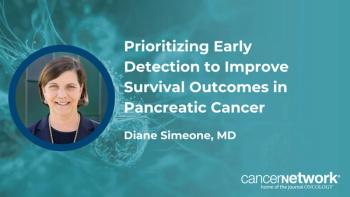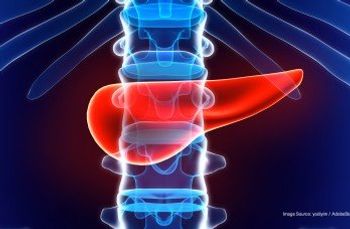
Oncology NEWS International
- Oncology NEWS International Vol 8 No 9
- Volume 8
- Issue 9
‘Gonzalez Diet’ to Be Tested in Pancreatic Cancer
NEW YORK-An innovative clinical trial to be conducted at Columbia University is now recruiting patients with advanced pancreatic cancer. The patients will test the effectiveness of the “Gonzalez regimen,” which combines a strict diet of fresh fruits, vegetable juices, dietary supplements, and pancreatic enzyme extracts with a “detoxification” program. John Chabot, MD, a surgical oncologist at Columbia, is the principal investigator.
NEW YORKAn innovative clinical trial to be conducted at Columbia University is now recruiting patients with advanced pancreatic cancer. The patients will test the effectiveness of the Gonzalez regimen, which combines a strict diet of fresh fruits, vegetable juices, dietary supplements, and pancreatic enzyme extracts with a detoxification program. John Chabot, MD, a surgical oncologist at Columbia, is the principal investigator.
The researchers are seeking 72 to 90 patients with advanced pancreatic cancer for the phase III randomized study, which is being sponsored by the NCIs newly established Office of Cancer Complementary and Alternative Medicine. Half the patients will receive standard therapy with gemcitabine (Gemzar), while the other half will take the Gonzalez regimen.
Pilot Study Promising
The trial, which was given a 5-year, $250,000 grant, is applying scientific methods to assess the efficacy of this alternative treatment. The NCI agreed to test the regimen after Nicholas Gonzalez, MD, a New York endocrinologist, conducted a pilot study of his protocol from 1993 to 1996. The results, reported earlier this year in Nutrition and Cancer, showed that 9 of 11 pancreatic patients survived for 1 year, five survived for 2 years, and four survived for 3 years.
For information about patient entry to the trial, contact Michelle Gabay, RN (212-305-9468) at Columbia Presbyterian Cancer Center.
Articles in this issue
over 26 years ago
Talking to Members of Congress About Cancer Issuesover 26 years ago
Modified SPECT Scintimammography Proves More Accurateover 26 years ago
Lilly Enjoined From Promoting Evista for Breast Cancer Preventionover 26 years ago
Experts Brief Capitol Hill on Trial Costs Surveyover 26 years ago
NIH Plan Quadruples Prostate Cancer Research Fundsover 26 years ago
Gabapentin as Adjuvant to Opioids in Neuropathic Painover 26 years ago
Biochemotherapy May Be an Option in Metastatic Melanomaover 26 years ago
PET Scans Spare Some NSCLC Patients From Mediastinoscopyover 26 years ago
Computer Technique Gives New Life to Thermal Breast Imagingover 26 years ago
Kytril Indicated to Prevent RT-Induced Nausea and VomitingNewsletter
Stay up to date on recent advances in the multidisciplinary approach to cancer.



















































